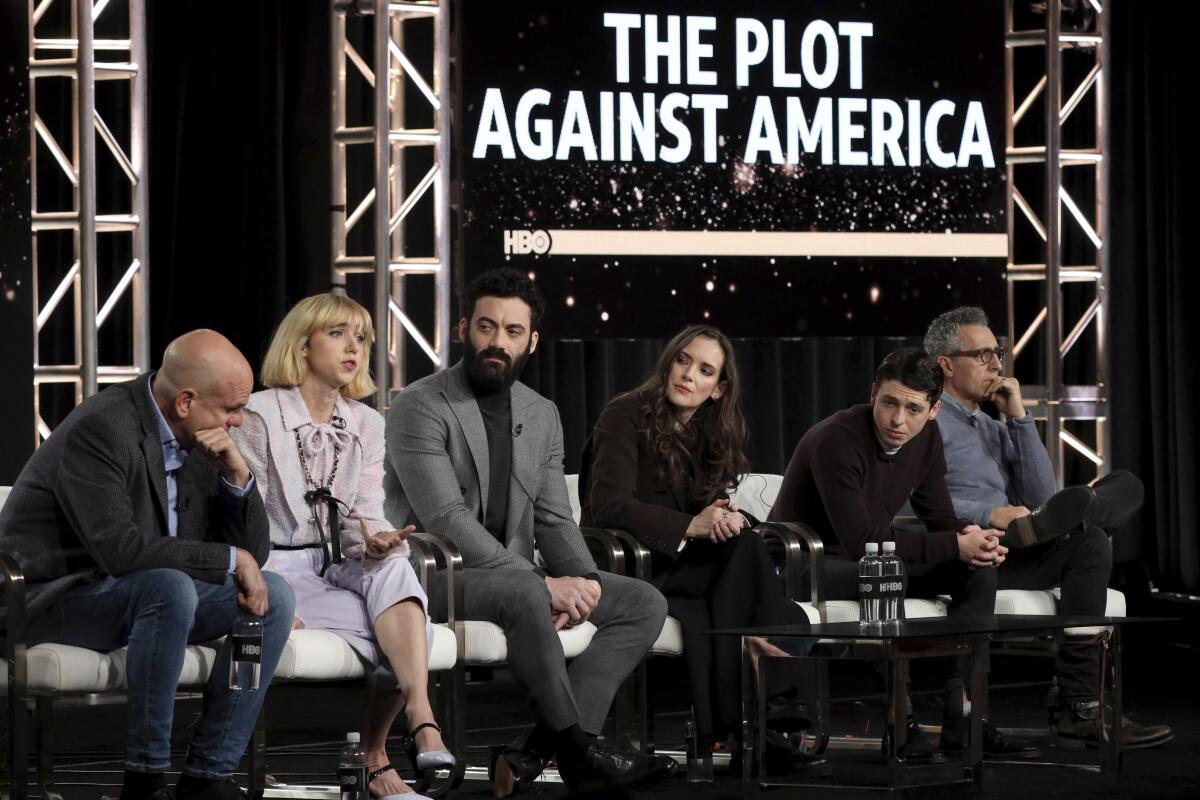Zoe Kazan stuns TCA with emotional remarks on grandfather’s role in Hollywood blacklist
- Share via
The Television Critics Assn. semi-annual press tour is generally a forum for actors and producers to spout promotional platitudes, not deeply thoughtful answers tying together Hebrew etymology, biblical allegory, intergenerational trauma and American identity.
But at a panel for “The Plot Against America,” Zoe Kazan stunned the room with a moving response to a question about the connections between her family’s difficult history and the themes of xenophobia, fascism and anti-Semitism explored in the HBO limited series. The six-part drama is adapted by David Simon from Philip Roth’s alternate history novel in which famed aviator, Nazi sympathizer and anti-Communist Charles Lindbergh is elected president in 1940.
The actress and screenwriter is the granddaughter of Elia Kazan, whose legacy as the director of such acclaimed films as “On the Waterfront” and “A Streetcar Named Desire” was tarnished by his decision to cooperate with the House Un-American Activities Committee and name peers in the film and theater community who had, like him, been involved with the Communist party. A number of these artists were Jewish.
Kazan began by referring to a discussion about the Hebrew word timshel that appears in the John Steinbeck novel “East of Eden,” which was made into a 1955 film directed by her grandfather. As she explained, a character in the book struggles with the meaning of the word as it appears in the story of Cain and Abel — sometimes translated as “you can triumph over sin,” other times as “you will triumph over sin.” What he ultimately concludes, she said, is “thou mayest triumph over sin, but it’s in the hands of the next generation; it’s a choice.”

“I have not wanted to weigh in on my family’s political history partially because the other people it involves in my family have prized their privacy over a public life,” she continued, appearing to hold back tears. “So I’m not going to go into it. But I will say I have thought a lot about how the history of our country affected my family’s history, what it meant for my grandfather as an immigrant to this country to have his Americanness tested, and the choice that he made from that, and I [have] thought a lot about my own choices that I’ve made, the way that I choose to live my own life. I think ‘thou mayest’ choose a different life.”
She also suggested that Steinbeck chose to include this in his novel “about the foundation of the West” because “it’s also about America choosing to recognize who they have been — Cain did kill his brother — but also recognizing that they may choose a different future for themselves. I think it’s meaningful in the book that it comes out of the mouth of an immigrant.”
She concluded, “Those were the things that were on my mind as I worked on this. It was a profound experience for me working on this, personally, politically, artistically. And I think that’s all I have to say about that.”
The journalist who asked the question also apologized for bringing up a difficult subject.
“You’re not bringing up hard times for me,” replied Kazan, who has gracefully deflected questions about her family history before. “You’re bringing up hard times for the country.”
In the series, Kazan plays Elizabeth “Bess” Levin, a Jewish mother and homemaker whose working-class family in New Jersey is profoundly affected by Lindbergh’s ascent to the White House and the fascism that ensues. Like most of the cast, including John Turturro, who is Italian American, and Anthony Boyle, who is from Northern Ireland, Kazan is not Jewish. Known for roles in “The Big Sick” and “Olive Kitteridge,” she has tended not to go into great detail about her grandfather’s complicated legacy.
Simon, who co-wrote the series with Ed Burns, called her response — which drew a round of applause in the typically silent ballroom — “the best answer to a question” he’d heard in more than a decade of TCA panels.
“That was so cool,” he said. “That had linguistics, that had film history. That was gorgeous.”
More to Read
The complete guide to home viewing
Get Screen Gab for everything about the TV shows and streaming movies everyone’s talking about.
You may occasionally receive promotional content from the Los Angeles Times.




